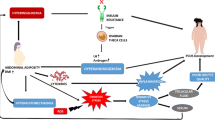Summary
-
1.
The history of a patient who developed schizophrenia after the birth of her first child is discussed; exacerbation of the psychotic symptoms occurred during the postovulative phase of menstruation; and there was sudden decrease of symptoms on the first day of menstruation or on the day when menstruation was to be expected without actually taking place.
-
2.
Both the hormonal change after childbirth, degeneration of placenta (sudden decrease of progesterone level), and exacerbation of psychotic symptoms during the postovulative phase (at a time when progesterone would normally be increased) suggest a disturbed endocrine, probably progesterone, balance.
-
3.
Insulin treatment induced a marked decrease of the psychotic symptoms and sensitized the autonomic centers, possibly involved in the schizophrenic process, for the following progesterone treatment.
-
4.
Progesterone completed the induced mental recovery; but, when it was discontinued, menstrual irregularity reappeared.
-
5.
Premenstrual “neurotic” tension accompanied by organic symptoms in other patients disappeared after administration of progesterone.
-
6.
Experimental determination of the “endocrine balance” is considered of great value for the therapeutic approach in schizophrenia.
Similar content being viewed by others
Bibliography
Allen, E. B.: The relation of menstruation to personality disorders. Am. J. Psychiat., September, 1933.
Angyal, A., Freeman, H., and Hoskins, R. G.: Physiological aspects of schizophrenic withdrawal. Arch. Neurol. and Psychiat., September, 1940.
Benedek, H., and Rubinstein, B. B.: The correlation between ovarian activity and psychodynamic process. Psychosomat. Med., April, 1939.
Benedek, H., Ovarian activity and psychodynamic process. Psychosomat. Med., October, 1939.
Davidson, G. M.: Concerning schizophrenia-manic-depressive psychosis associated with pregnancy and childbirth. Am. J. Psychiat., May, 1936.
Everett, John W.: The restoration of ovulatory cycles and corpus luteum formation in persistent-estrous rate by progesterone. Endocrinology, 27: 4, 681, 686, October, 1940.
Fischer, S.: Treatment of schizophrenia with glandular extracts. Arch. Neurol. and Psychiat., 90: 4, 644, October, 1939
Fulton, J. F.: Central levels of autonomic functions, with particular reference to the endocrine organs. Revue Neurologique, 72: 1939, 1940.
Hoskins, R. G., and Sleeper, F. H.: Endocrine studies in dementia præcox. Endocrinology, 13, 245.
Karnosh, L. J., and Hope, J. M.: Puerperal psychosis. Am. J. Psychiat., November, 1937.
Pfister, O.: Supplementary volume, Am. J. Psychiat., May, 1938.
Smith, G. van S., and Smith, C. Watkins: The rôle of progestin in the female reproductive cycle. J. A. M. A., 97: 1857, 1931.
Zilboorg, Gregory: The dynamics of schizophrenic reactions related to pregnancy and childbirth. Am. J. Psychiat., January, 1929.
Author information
Authors and Affiliations
Rights and permissions
About this article
Cite this article
Blumberg, M.A., Billig, O. Hormonal influence upon “puerperal psychosis” and neurotic conditions. Psych Quar 16, 454–462 (1942). https://doi.org/10.1007/BF01573909
Published:
Issue Date:
DOI: https://doi.org/10.1007/BF01573909




